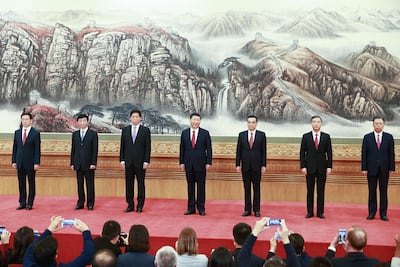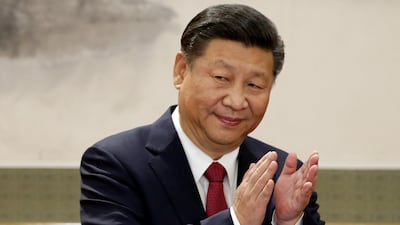Chinese president Xi Jinping was formally handed a second term on Wednesday with no clear successor emerging in a revamped ruling council.
It cements his grip on power and sets the stage for him to dominate China for decades to come.
In a highly choreographed event, Mr Xi led the new members of the elite Politburo Standing Committee in front of television cameras at Beijing's massive Great Hall of the People after their selection by 204 party officials in a closed-door vote.
Mr Xi, 64, secured a second five-year term as general secretary of the Communist Party after his political theory was enshrined in its constitution, giving him an inviolable mandate to rule and possibly positioning him to retain power for much longer.
He was also reappointed head of the country's Central Military Commission.
________________
Read more:
China enshrines 'Xi Jinping Thought' in its constitution
Opinion: China's 'strongman' leader Xi puts on more muscle
Is China's Xi looking to hold on to power beyond his 10-year term?
________________
Premier Li Keqiang, 62, retained his seat on the seven-member committee while five other men — all little known outside China — replaced members who had reached an informal retirement age of 68.
In a speech, as the other committee members stood expressionless in dark suits, Mr Xi heralded a "new era" for the country under his rule and said the party "must get a new look and more importantly make new accomplishments".
But the new ruling council looked decidedly old, raising doubts that any could succeed Mr Xi.
"Xi Jinping doesn't want to share power. He doesn't want someone breathing down his neck, preparing the succession," said Jean-Pierre Cabestan, China specialist at Hong Kong Baptist University.
"He wants to keep pressure on everybody and enjoy power for five or 10 years without having his hands tied."
All the committee's members are at least 60 years of age. Under the current rules, they would be too old to serve the customary two terms as the party's leader at the next congress in 2022.

Mr Xi was elevated to the committee in 2007, when he was 54, and succeeded Hu Jintao as general secretary and president five years later.
The new committee members are Xi confidant Li Zhanshu, 67, vice premier Wang Yang, 62, leading Communist Party theoretician Wang Huning, 62, party organisation department head Zhao Leji, 60, and Shanghai party chief Han Zheng, 63.
Mr Zhao, a Xi ally, was also appointed as head of the anti-corruption agency, which has brought down 1.5 million officials, including several of the president's rivals since 2012.
Despite their promotion to the nation's highest leadership circle, the new committee members are likely to have much less influence than their predecessors under a newly empowered Mr Xi.
His reappointment capped a twice-a-decade congress of the Communist Party that gave him a freer hand to accomplish his ambition of turning China into a global superpower with a world-class military by mid-century.
The constitutional amendment to include "Xi Thought", which the congress passed on Tuesday, has put Mr Xi in the rarefied company of the nation's founder, Mao Zedong, and Deng Xiaoping, the architect of the country's economic reforms.
"He will use this boost to push forward his ambitious agenda," said Matthias Stepan of Germany's Mercator Institute for China Studies.
"It will guarantee him a place in the history books."
The accolade firmly establishes Mr Xi as the country's locus of power, potentially upending the collective model of leadership promoted by Mr Deng and embraced by Mr Xi's two predecessors, Hu Jintao and Jiang Zemin, who both stepped down after two terms.
In the past two administrations, decisions were the result of horse-trading and consultation among members of the standing committee, the council of party elders which has led China since Deng's death in 1997.
But with his name in the constitution, Mr Xi has become the nation's ultimate authority, likely giving him the last word on all major decisions.
The document's "all-round embracing of Xi's thought reflects the high degree of consensus the Party has built around its leadership core", the state-run China Daily newspaper wrote in an editorial on Wednesday.
During his speech, Mr Xi called for ever stricter management of the party, suggesting his grip on power will only increase.
Over the last five years, he has waged a ruthless campaign on official corruption, but party discipline is "a journey to which there is no end", he said, calling on members to "rid ourselves of any virus that erodes the party's fabric".
At least one important figure did not make the cut, as Mr Xi's right-hand man, Wang Qishan, 69, vacated his standing committee seat.
Analysts had thought the leader of the country's anti-corruption campaign might be kept on in defiance of the party's unofficial guideline that cadres retire at 68.
The BBC, The Economist, the Financial Times, The Guardian and the New York Times were denied invitations to cover the unveiling despite wide access granted to other news outlets, according to the Foreign Correspondents' Club of China.
"It is hard to avoid the conclusion that these media organisations have been singled out to send a message," it said, adding that using access as a tool to punish journalists violated principles of press freedom.

